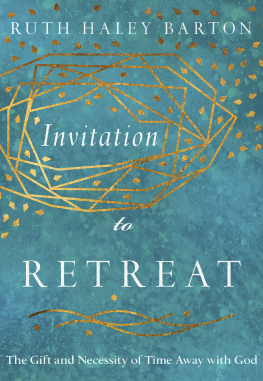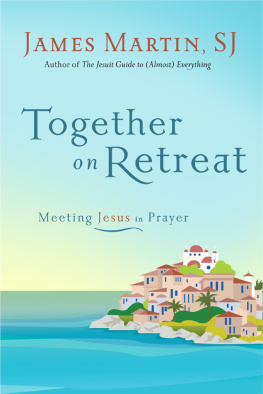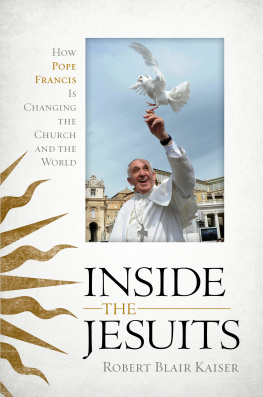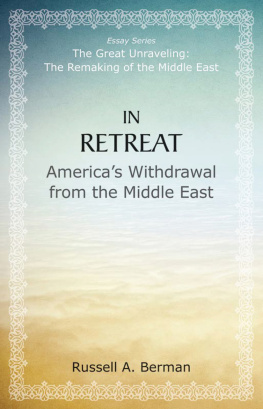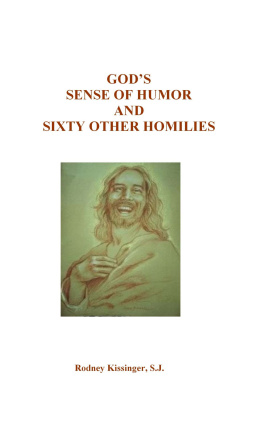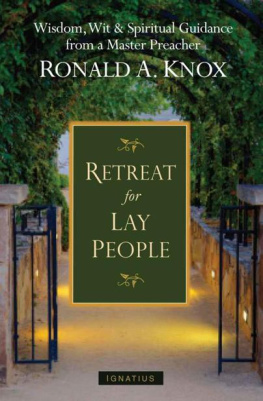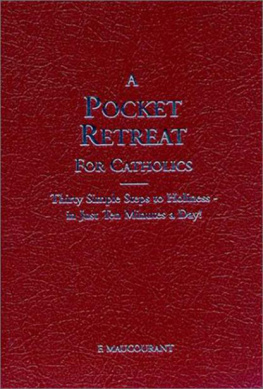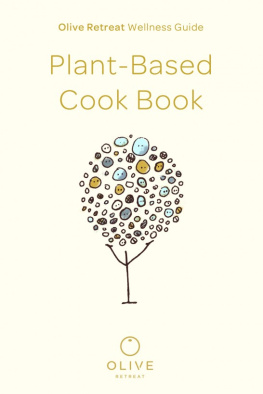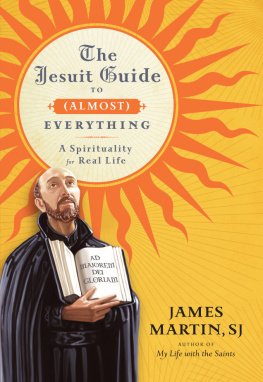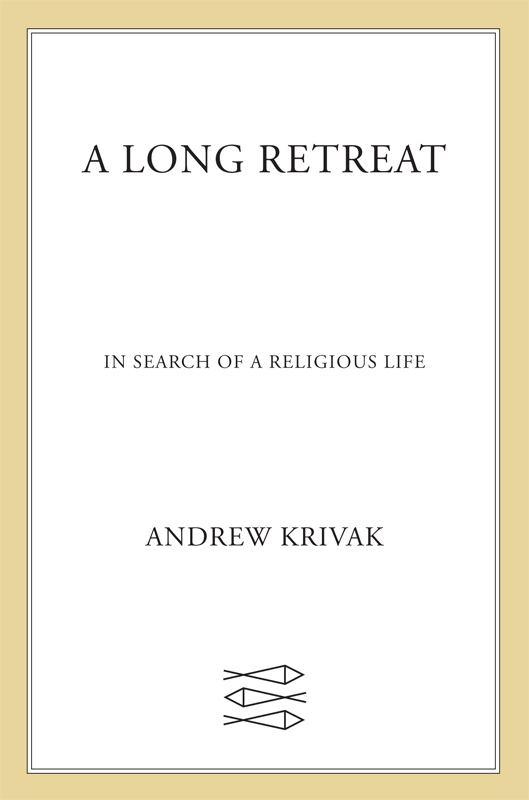Contents
Guide

The author and publisher have provided this e-book to you for your personal use only. You may not make this e-book publicly available in any way. Copyright infringement is against the law. If you believe the copy of this e-book you are reading infringes on the authors copyright, please notify the publisher at: us.macmillanusa.com/piracy.
Contents
To Amelia and Cole
Late have I loved you, beauty so old and so new: late have I loved you.
St. Augustine, Confessions
It will be neither a return nor a departure but a continuing.
John McGahern, The Leavetaking
This is a work of nonfiction. Some names and details of places have been changed to protect the privacy of certain persons, but I have otherwise sought to describe characters and events as they were. For these Ive relied on letters, journals I kept as a Jesuit, and memory. When I had to question one or all three of these, I went back to my brothers, blood and spiritual both. Apart from who watched a fast creek and cheap raft collide one Saturday of Easter weekend a long time ago, and whether or not it really did snow in Syracuse on Christmas Eve 1990 (it always seemed to be snowing), those Ive asked for corroboration have corrected or otherwise found little fault with this retelling. What mistakes remain are mine.
Let me begin with an ending not yet my own.
The two or so December days during which my family waked and buried my father after his sudden death at the age of eighty moved in a kind of brume that shortened sight and left memory behind. But after the prayer of committal, as we and an entire community of mourners were all about to leave the church, I heard the few spoken words that gave me some peace in the last quiet moments of that Mass for the dead. Father Peter Crynes, the priest my father in his old age had come to know and trust, one in a long line of priests who labored as good pastors in the vineyard we knew as St. Thereses, rested his fingertips on the coffins lacquered pine surface and whispered as though only the departed should hear: Well done, good and faithful servant.
Rain held off until the interment. Then, while we were gathered for lunch inside a windowless dining room of an American Legion hall in the old mining town of Luzerne (the only venue unoccupied on such short notice in the Christmas season), the skies let loose in a torrent that pounded like fists on the roof.
My wife Amelia and I rode back to my mothers house with my younger brother Matthew, and as we drove through the downpour and into the Back Mountain toward the town of Dallas, Pennsylvania, where we grew up, he broke the silence, wondering out loud in a moment more of anger than of introspection if in fact there was a Heaven, some life after death. Or if there was, in spite of what our father and mother had taught us and believed in themselves, nothing. Of my three brothers and three sisters, he lived the closest to my parents, after having moved back to the Area, as everyone called this part of Northeastern Pennsylvania, from Iowa a few years earlier. The two fathers of sons seemed to hit it off all over again, and I think that when the old boy died, my younger brother lost a friend. So I considered what arguments I could and could not give from philosophers and theologians Matthew had never read, but to whom I had turned when it was my time to leave home. I remembered that in years past he used to smile, clasp my shoulder, and say Hey, Padre! whenever we met. I believed on that day, as St. Paul told the earliest Christians, that our homeland is in heaven and our lives are a kind of waiting, our death only the appearance of an end. Behold, I tell you a mystery. We will not all sleep, but we will all be changed.
I said, Is there a Heaven? I hope so. More than that I just dont know.
He nodded, disappointed with my answer, I thought; then realized that this was what he expected from the brother who had read and traveled more than he but who had no house, or car, or occupation that he could point to. What did he want me to say? ( This I know! ) Well, I think theres nothing, he said, accelerated around the slower traffic, and put an end to the conversation.
Absence is an equable and yet vertiginous state. Sit calmly at a distance and it appears yet another fact of existence, a thing to touch and say, Yes, this is so. But stand to approach, or rather to face it approaching, and the calm shatters into dizziness, weakness, and tears so unexpected that you cannot be certain you wont somehow drop or fall inexplicably if you take a single stepthe characteristics, not coincidentally, of a deep, if not unshakable, faith. We did the best we could that day as a family in name to cohere around the edges of what my father had occupied with his blithe yet booming presence and then so uncharacteristically left. Until it was time for each of us to leave. After three days, in spite of the chasm between what one might and what one might not discover beyond, we had to get on with our lives. We had to continue with our work, wives, husbands, children for some, and now the one thing we all held in common: loss.
My mother sat me down as I was packing and asked me if there was anything of my fathers that I might like to have as a remembrance. My brothers owned property and worked with their hands for a living, so they took the tools and saws and machinery that were scattered about the basement workshop of the small, three-bedroom ranch my parents had lived in for fifty years. There was a plane to catch and an ocean to cross. A tiny, pearl-handled pocketknife gleamed among the effects she had spread out before me. I remember seeing it and wanting it as a boy when I became aware one day that I had grown tall enough to peer into that seemingly gigantic mans high, wooden dresser. I plucked the knife from the offering of watch, fountain pen, religious medals, and cuff links. Yes, take that, she said, understanding, I believed, the significance of such an insignificant piece. What else was there that my father hadnt already given to me? When I wanted to drop out of college, work on boats, and travel around the world (my first vague notion of retreat), he said, There wont be anything when Im gone. So take the education Im offering now, will ya? And I did.
Amelia and I were returning to London on an open jaw out of Boston. It would be a long shot through the Poconos, across the Delaware, and into New England, so I suggested we drive to Syracuse for the evening, stay at an inn on Lake Cazenovia, and take the Thruway to Massachusetts the next day. I wasnt being romantic. Snow was forecast for the entire East, and the emotional weight that came with death had ground me down to exhaustion. I felt as though I had been awake for three days. That lakea place I used to go to rest in another lifewas the only place I knew where I could stop, lie down, and sleep. Maybe, though, in the back of my mind, I knew what I was doing coming this way one more time.
When we got to Syracuse, I recognized immediately our proximity to the Jesuit novitiate of St. Andrews, a house in which I lived for two of the eight years I spent in training for the Catholic priesthood with the Society of Jesus. Its presence was compelling. Unavoidable, I have to say, as unavoidable as on the day my mother and father drove me there in August 1990after I had graduated from college and graduate school, and worked for two yearsto begin the life they thought I would live to its natural conclusion.


